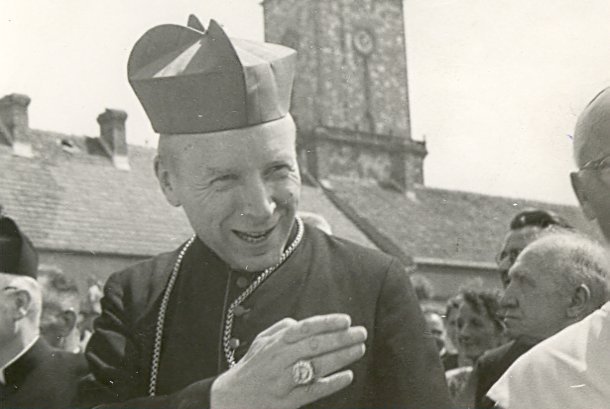Father and Shepherd #6 | At the episcopal see in Lublin


Kard. S. Wyszynski podczas pielgrzymk nauczycieli na jasnogorskich walach. 30.06.1957r., fot. Instytut Prymasowski, wyszynskiprymas.pl
Cardinal Stefan Wyszyński the Primate of Poland has remained in the memory of Poles as a statesman, defender of faith and freedom of the homeland, advocate of unconditional human dignity.
Father Wyszyński – as he mentioned many times later – was surprised by the nomination and asked for time to think. He prayed all night. He did not feel prepared for such a task. Until the end of his life, he reproached himself for not believing immediately: “A man is never well prepared for a task that is suddenly entrusted to him. And I had a lot of doubts. Therefore, I was reluctant to follow the Mother of Christ, who immediately said: “Here I am, the handmaid of the Lord.” I didn’t do it that quickly. I thought too humanly, I remembered my own ineptitude, and I forgot what God can do with whatever tools He chooses to do. ”
Bishop Wyszyński began his ministry in the name of the Mother of God. He entrusted her by choosing Jasna Góra as the place of episcopal consecration on the 12th May 1946. In his episcopal coat of arms he placed the image of Our Lady of Jasna Góra. In a pastoral letter for the day of ingress to the Lublin cathedral, he wrote: “I come here straight from Jasna Góra, from the Mediatrix of all graces (…). On my episcopal shield I carry the cheerful, though scarred face of Mary. With all my childhood faith, I asked her for favours for you and for myself, Beloved Brothers, Priests and Faithful, for a blessing for our joint work; I trust that the Bride of the Holy Spirit, the Queen of the Apostles and the Help of the Faithful, the Mother of Jasna Góra will be both for me and for you, Beloved Ones, a shield in battle, a victory and a gate to heaven ”.
In Lublin, he tried to warmly care for people depressed by warfare. He travelled throughout the diocese, reaching its farthest and most dangerous corners, visited parishes, and at times confirmed thousands of people. There was a lot of neglect over the years of the war. Roads were often impassable. He travelled to many places in a horse-drawn carriage. He also visited the poorest districts of Lublin, visited the faithful in the ruins of their houses. He was able to visit a pub in Lublin on Good Friday to ask the men what they were doing there on such a day. He received a disarming answer: “Our women clean, cook, bake cakes, and we don’t want to disturb them.” The sight of the bishop in such a place brought them to sobriety. The Bishop of Lublin was a support for politically persecuted people, he pleaded for prisoners, and did everything to save them from death sentences for participating in the actions of the Home Army or in partisan units. God himself multiplied his strength and assigned more and more difficult tasks.
On the 22nd October 1948, the Primate Cdl. August Hlond died. Bishop Wyszyński wrote in his notes: “So often, I thought that in the extremely difficult situation of the Church in Poland, his blessing was the Steersman, leading through his torments with a steady hand. You felt strangely calm around Primate Hlond. As he wrote these words, he did not know that he would be the providential helmsman from then on.
Father and Shepherd #1 | Childhood >>>
Father and Shepherd #2 | Seminary and priestly ordination >>>
Father and Shepherd #3 | The beginning of priestly ministry >>>
Father and Shepherd #4 | Among the workers in Włocławek >>>
Father and Shepherd #5 | Wartime exile >>>





Dodaj komentarz